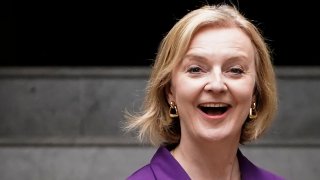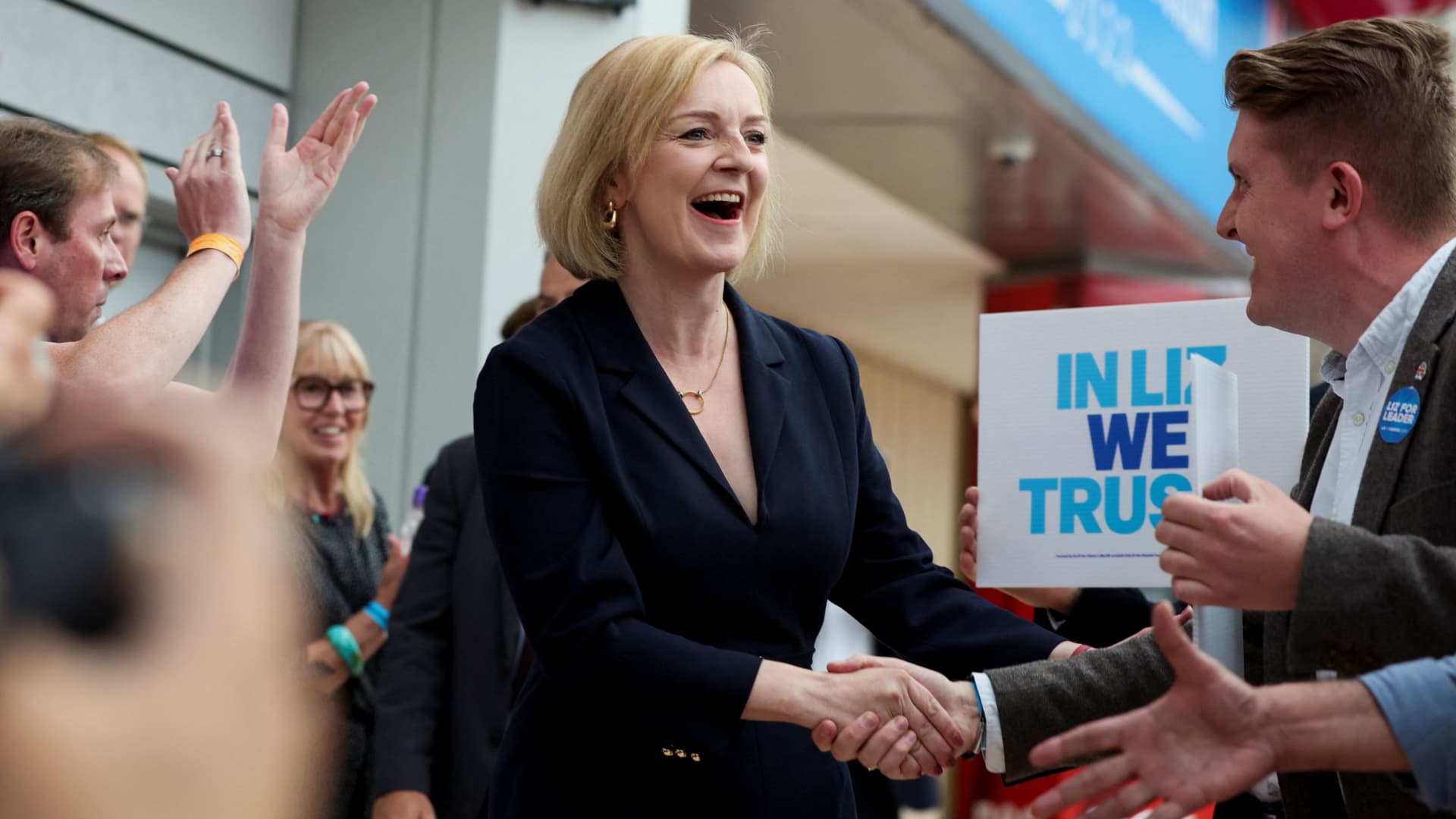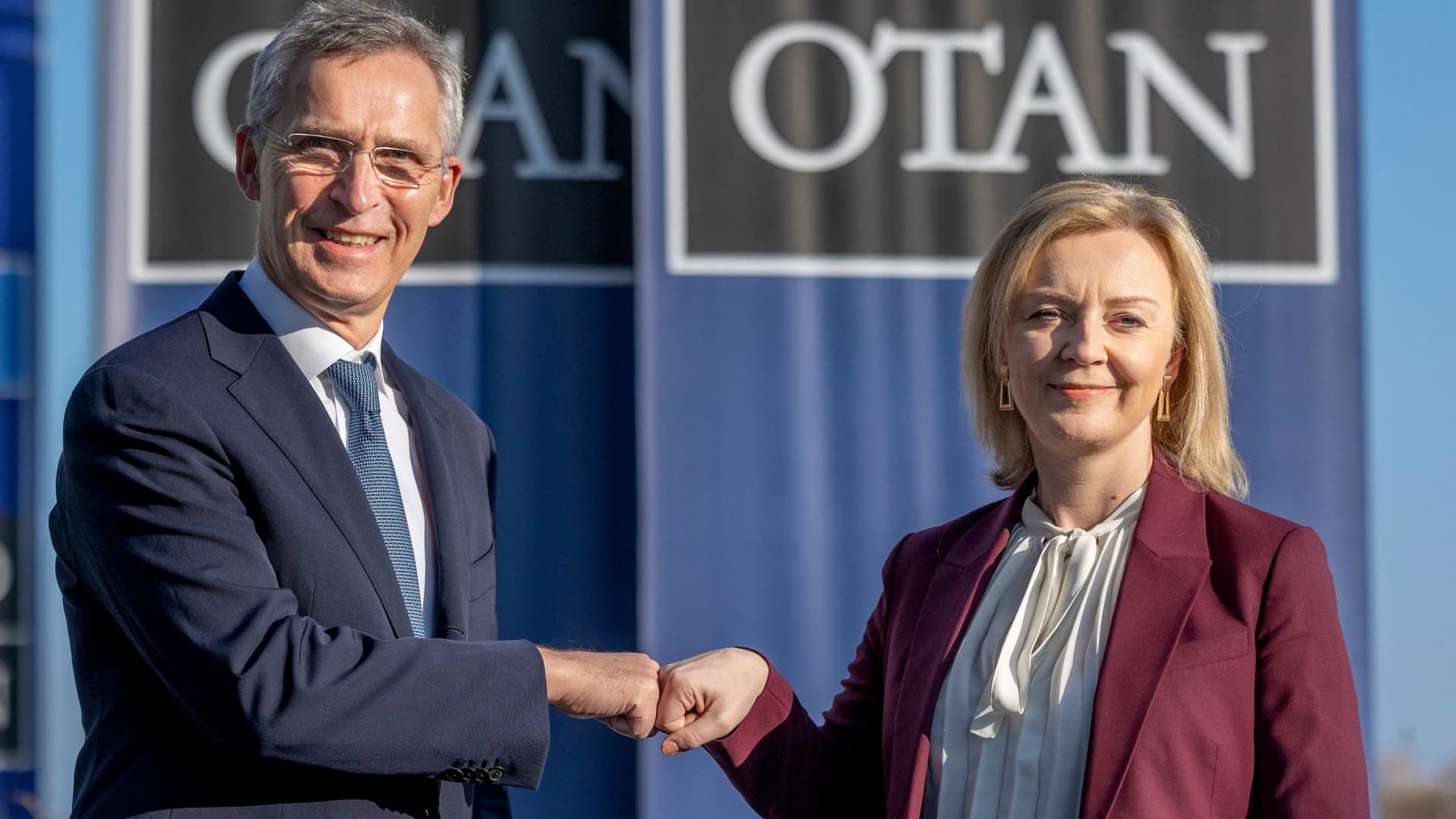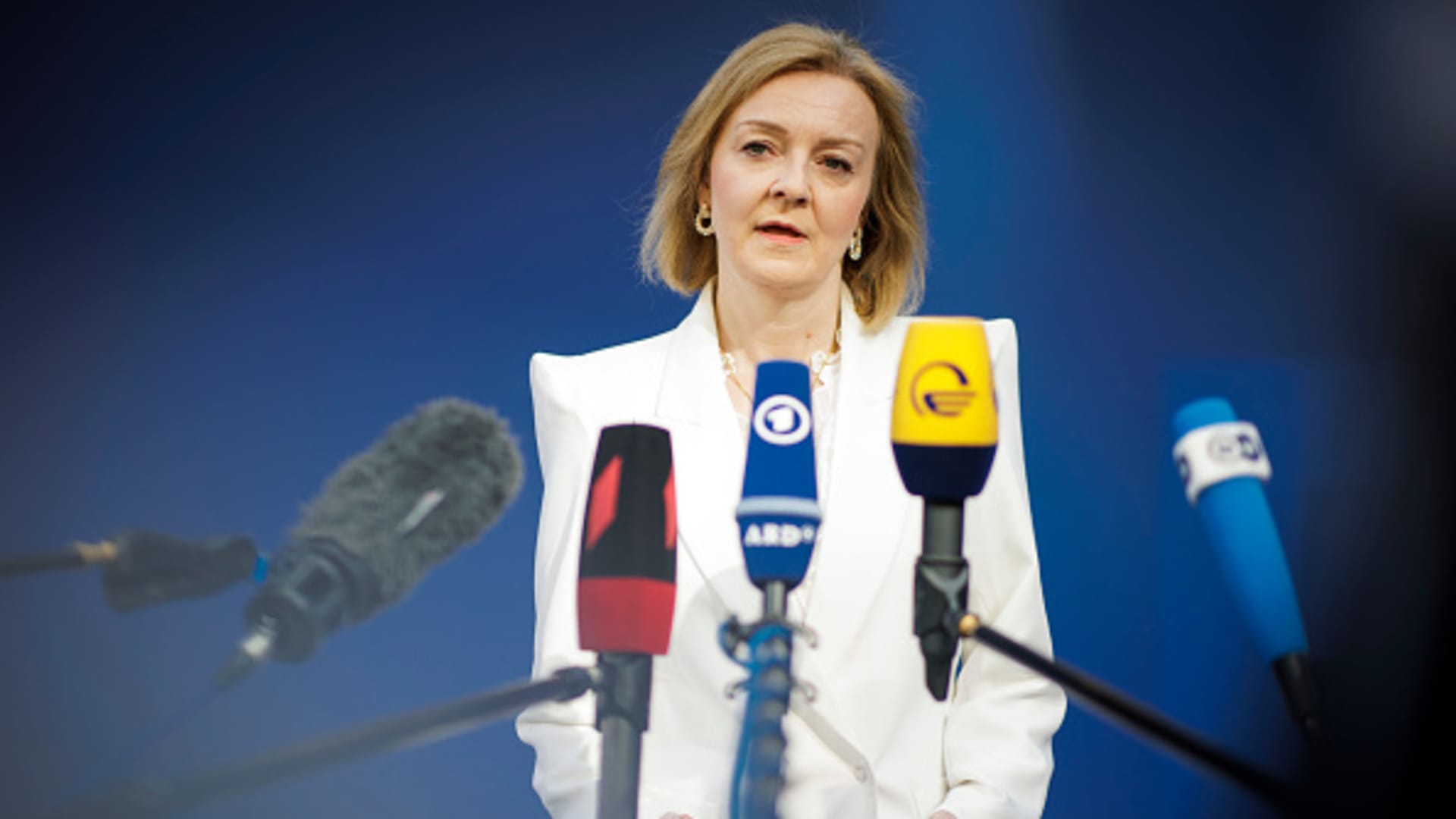
- After a drawn-out Conservative Party leadership contest — and something of a political power vacuum in the U.K. following the resignation of outgoing Prime Minister Boris Johnson — the country now has a new leader: Liz Truss.
- Truss, formerly the U.K.'s foreign minister, beat rival Rishi Sunak, the country's former finance minister, to win the leadership race with the result announced on Monday.
LONDON — After a drawn-out Conservative Party leadership contest — and something of a political power vacuum in the U.K. following the resignation of Prime Minister Boris Johnson — the country now has a new leader.
Liz Truss, until now the U.K.'s foreign minister, beat rival Rishi Sunak, the country's former finance minister, to win the leadership race with the result announced on Monday.
With members of the Conservative Party asked to vote for their favorite candidate, around 57% voted for Truss while 42.6% voted for Sunak.
Get Connecticut local news, weather forecasts and entertainment stories to your inbox. Sign up for NBC Connecticut newsletters.
Truss has taken around 57% of the vote while Sunak achieved 42% of the vote.
With a cost-of-living crisis brewing in the U.K., as elsewhere in Europe as inflation continues to rise, Truss will have to hit the ground running to deal with the immediate squeeze on Britons' pockets, with energy bills forecast to soar in the fall.
Political commentators and economists have been poring over Truss' political history as well as her economic pledges on the campaign trail for a better idea on where she might take a country that, as well as facing a potential imminent fall in living standards, is yet to find a grip on the economic cost of the Covid-19 pandemic or the fallout from leaving the EU.
Money Report
CNBC has a whirlwind guide to the U.K.'s new prime minister, with some of the more standout moments in her political career so far.
Truss past, present (and future?)
While she's been elected the new leader of the ruling right-leaning Conservatives (and thanks to that, the new prime minister) Truss cannot be said to have been born and bred into the Conservative Party tribe.
Truss, now 47, was born into what she has described as a left-wing household, her father a mathematics professor and her mother a nurse.
She recalls her mother taking her on nuclear disarmament marches, run by the Campaign for Nuclear Disarmament (CND), in the early 1980s where they would sing anti-Margaret Thatcher songs. In another radical departure from her present political incarnation, Truss was an active member of the center-left Liberal Democrats party as a young adult, once advocating the abolition of the monarchy while speaking at a party conference.
However, it was after completing her studies for a degree in philosophy, politics and economics (a common course for British politicians to take at university) at Oxford that she decamped to the Conservative Party.
Truss married accountant Hugh O'Leary in the year 2000 and in the ensuing decade, she threw herself into politics, attempting (and failing twice) to be elected as a Conservative Member of Parliament.
In 2010, however, she finally succeeded in becoming the MP for South West Norfolk, which remains her constituency now — although faced another hurdle to reach that position when local party activists tried to have her deselected as a candidate as she had not declared an affair in 2006 with a married MP, Mark Field. Her marriage survived the revelations and she and her husband have two teenage daughters.
It was in then-Prime Minister David Cameron's government a decade ago that Truss really rose to political prominence, serving as as parliamentary under-secretary of state for childcare and education in 2012 and then environment secretary two years later.
In that role, Truss was widely lampooned for a speech she gave at the Conservative Party conference in 2014 in which she made what was seen as an exaggerated plea for British cheese, telling the conference in earnest: "We import two-thirds of our cheese. That. Is. A. Disgrace."
Ahead of the 2016 referendum on EU membership, Truss campaigned on the "Remain" side but later said she regretted that stance and backed Brexit. In Boris Johnson's government she has held the position of international trade secretary and then, until now, foreign minister.
'Reaganomics'
There has been speculation that Truss is a fan of "Reaganomics" and could pursue similar policies in power. Reaganomics refers to the economic policies implemented by former U.S. President Ronald Reagan in the 1980s which broadly aimed at reducing taxes and regulations while also reducing public spending and controlling the supply of money.
Exponents of such policies say they promote a "trickle-down" effect where lower taxes on businesses in turn spur investment and growth but critics say such policies increase income disparity and social inequality while increasing public debt.

According to a report by Unearthed, the investigative arm of Greenpeace, Truss visited conservative think tanks in the U.S. in 2018 to discuss tax and regulatory reform.
Neither of those thinktanks, the Heritage Foundation and American Enterprise Institute, could confirm to CNBC that such meetings had taken place. The former told CNBC it had no record of any public appearance or private meeting held in 2018 with Truss, while the latter could not confirm or deny such a meeting had happened.
At the time of the alleged meetings. Liz Truss was chief secretary to the Treasury. The U.K. Treasury confirmed to CNBC that on Sept. 19 in 2018, Truss attended several meetings in the U.S., meeting with the American Legislative Exchange Council to discuss "state level economics" and attending two roundtables; one with Americans for Tax Reform (to, unsurprisingly, discuss tax reform) and a Heritage Foundation Regulatory Reform roundtable.
During her time at the Treasury, Truss argued against government bureaucracy and state interventions in people's lives, as well as against higher government spending that she said would mean higher taxes, saying this would mean the Tories were "crushed" at the polls.

Nonetheless, Truss does appear to favor policies akin to those during the era of "Reaganomics." She pledged tax cuts on the campaign trail, including reversing a rise in the rate of National Insurance tax (this tax pays for social security spending in the U.K. and the tax rise was introduced by then-Chancellor Rishi Sunak, Truss's rival in the leadership race, in April) as well promising no new tax rises and no energy rationing.
She has argued that instead of funding tax cuts with reduced public spending, the U.K. should issue more debt and extend the maturity of its public debt.
Truss has also been keen to appear business-friendly (a far cry from her predecessor Johnson who once famously quipped 'F--- business") as she has promised to scrap a planned rise in corporation tax from 19% to 25% that was set to come into force in 2023.
In an interview with the BBC on Sunday, Truss said she would announce a plan to deal with the U.K.'s rising energy costs within a week of taking office, although she offered no details on how she would do this. She had announced several weeks ago that she would introduce an emergency budget in the first few weeks of taking office to ensure support was on its way as bills rise.
She has already announced that she would temporarily suspend green levies on energy bills but experts say she will have to dig far deeper to tackle a looming crisis with British energy bills expected to hit over $4,000 a year per household in 2023 if action is not taken.
Bills and Brexit
Just how far Truss will be able to realize her economic pledges remains to be seen, of course, with economists saying it's easy to make promises on the campaign trail. Berenberg Bank Senior Economist Kallum Pickering noted that in any case it's the future finance minister that will hold the purse strings.
But in any case, the U.K.'s new leader is facing a challenging economic backdrop, Pickering said in a note published ahead of the leadership result.
"The combination of surging inflation and tightening monetary policy is tipping the U.K. into a mild (in terms of output losses) but painful (due to high inflation and rising interest rates) recession that will last until the second quarter next year," he said, describing the outlook as one of "slumpflation" that the next prime minister would have to deal with. Truss has also indicated that she would review the Bank of England's mandate.
Meanwhile, it's uncertain what direction the U.K.'s fractious relationship with the EU will take under Truss.
As mentioned, her former "Remainer" status has come to haunt her and she has since talked tough on the EU, keen to appeal to a large pro-Brexit contingent in the parliamentary Conservative Party and its wider membership.
It was Truss, for example, who in June put forward the controversial "Northern Ireland Protocol Bill," proposed legislation that would give U.K. ministers powers to unilaterally scrap parts of the Brexit deal regarding Northern Ireland, much to the EU's annoyance.
For its part, the bloc has reportedly said it will not continue negotiations over Northern Ireland while the bill continues its passage through the British Parliament.

The British public's appetite for an ongoing political battle over Brexit is likely to be limited, Pickering said, noting that what the British economy needs most right now is a return to "stable and predictable politics."
"We think that the wider U.K. public is now bored by Brexit. Instead, noisy U.K.-EU relations and the risk of a trade war with the EU if the U.K. reneges on its commitments add to economic uncertainty and hurt business investment," he said.
The new leader of the U.K., he added, "will probably see that it is in their interest to pursue a calmer approach to EU matters than the populist Johnson."






